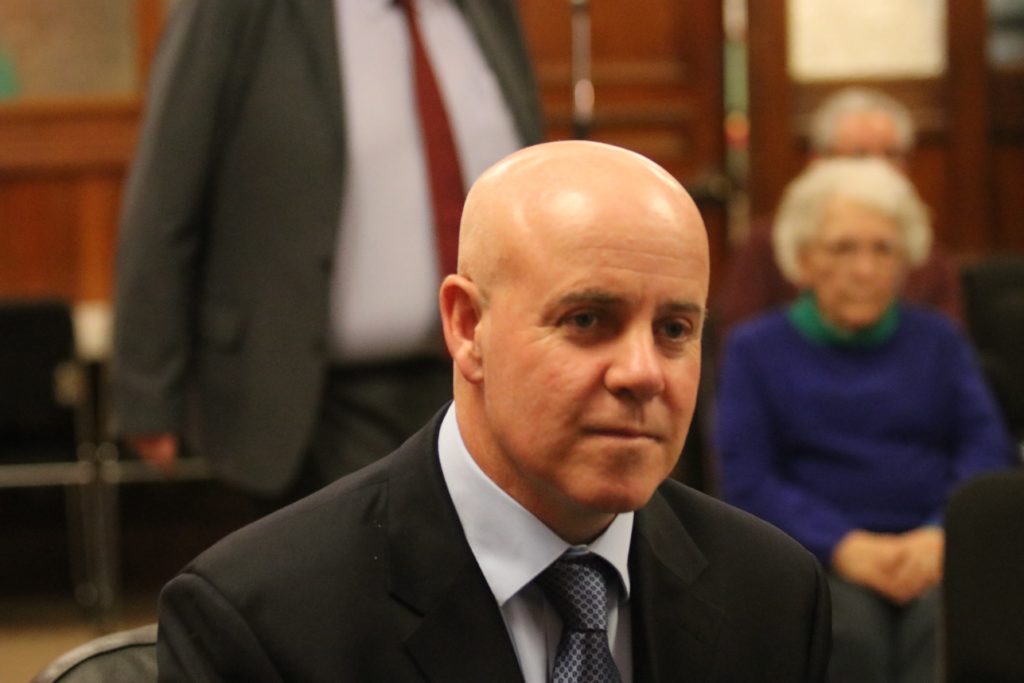Photo: A close call whether this vehicle is impeding sidewalk travel
For the first time in more than a decade, most parking ticket fines are increasing, going up $10 to $25 after a vote by the Select Board on Monday, April 11. But it could take a while before scofflaws hand over the higher fine.
The hike in the parking penalties came as part of a presentation of a citizens’ petition that will come before Town Meeting on May 3.
Town Meeting Member Gi Yoon-Huang of Winn Street (Precinct 8) told the Board of a safety issue involving vehicles that jut out of driveways and block the sidewalk. She said in her precinct, this is forcing children and parents heading to the Winn Brook School to enter the street to go around them.
She was spurred to launch this effort after speaking to a resident who uses a walker and fell attempting to move past a car blocking the sidewalk.
Yoon-Huang said while police would respond quickly to calls and the owners eventually move their vehicles, “it would often be a repeat offender … and it took us years to have this one street cleared.”
“The main goal [of the petition] is to bring awareness that this is a problem, but also to further clarify it further,” said Yoon-Huang.
Her petition would also increase the parking fine for this offense – after a first warning – which will increase with each infraction; a second ticket would be $50 and a third and more at $100. The petition would require stepped up communication with residents on the new bylaw.
“This is to help improve safety for everyone,” said Yoon-Huang, who has agreed to make a presentation before Town Meeting at which time the town will adopt the bylaw provisions into the existing parking regulations. Her petition will then be tabled, and a motion to dismiss will be presented to Town Meeting.
Belmont Police Chief James MacIsaac said his department actively targets any vehicle that is an obstruction, including those crammed into driveways to avoid violating the town’s 60-year-old overnight parking ban enforced between 1 a.m. and 7 a.m.
“So they have a choice to make. They leave the car out at night, and they absolutely get a ticket, or they squeeze it in the driveway. An officer working the midnight shift is not going to probably tag those cars in the drive way as they are making an effort to be off the street,” said MacIsaac.
But for a group of residents, the current $15 fine isn’t much of a deterrent. “Some people pay them and just go on violating it,” he said, noting the last time Belmont increased ticket fees was 2005, and before that, in the 1980s.
A few parking violations have unique penalties, such as parking at an MBTA bus stop which is $100, and $50 for stopping in a designated bike lane.
MacIsaac noted that during his nearly quarter century in law enforcement, residents’ first and overriding complaint about his department is parking tickets. “I’ve been people get ten times more upset getting a $15 parking ticket than a $200 speeding ticket.” The chief said officers issue an average of 28 parking tickets daily, of which eight to nine are overnight violations.
MacIsaac said that of the two sections of state law (MGL 9020) governing traffic citations, Belmont adopted the one where most tickets top out at $25. He said creating a unique violation with an increasing fee would run counter to state law. If the town wants to raise ticket fees, it should adopt the other section of the ticketing law – which only Boston and Cambridge have adopted – under which Belmont can jack up parking ticket fees to $60.
“I actually think that the dollar fine would really spur good behavior,” said Elizabeth Dionne on her first meeting as a board member. “I think $20 is not that significant. I think $50 and $100. The goal is never to collect the money. The goal is to have clear sidewalks.”
Board member Roy Epstein believes that “it’s not necessary to jump to a very high fine right away” to force compliance; instead using the existing enforcement options available to the town. He said under the current traffic citation law, the police can return to towing vehicles (suspended during COVID) for someone with a significant number of tickets as well as “boot” vehicles “just to let them know that we are serious about this.”
While not wanting to impose a significant increase in the parking fee structure, Epstein said it was time to bring these penalties to a more realistic level.
“I think its time to increase all of the $15 to $20 because of 20 years of inflation,” said Epstein, with Dionne suggesting upping it to $25.
The discussion then proceeded to whether the town needed to include vehicles as an “obstruction” impeding pedestrian travel on a sidewalk. Town Moderator Patrice Garvin said town bylaws already call for action on any “obstruction,” whether it’s a car, shrubbery, or snow.
Rather than bringing complicated issues on enforcement before the 290-member Town Meeting, Paolillo said the board would “combine the spirit of some of the things [in the citizens’ petition] into our parking regulations and increase our fines. I think that goes a long way to address the concerns of the petitioners.”
While the board quickly passed the new $25 parking fine, there will be some leeway before the bylaw goes into effect. MacIsaac said the department will need to finish the existing supply of ticket books with the old fine before ordering a new batch with the $25 fee.
